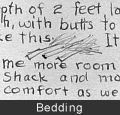| Chapter 10: It's a
Tough Life
I had not been there long when I became acquainted with the subject of lightning. Even on clear days my telephone wire was alive with static electricity, so that it was too alive to touch. When a thunder storm was raging, I was just high enough to be in the midst of it. Every tree near my shack was dead, probably from lightning, as they were torn lengthwise. The telephone wire spit, almost continuously, a stream of sparks. The tin roof with its stove pipe would go "ping" every now and then, and the windows all around would show every flash. The mountains would echo with the thunder. If I ever was afraid of lightning, I was then. Before going there I was often very uneasy about lightning. Since that trip, I have hardly given it a thought [see related poem].
It gave me more room in my shack, and more comfort as well. There was a tough grass with a white tassel standing high, called "Bear Grass," which made a fine top layer. The roof was covered with shakes, and did not leak a drop. I was much less nervous there, lacking the metal mentioned above. I was mildly criticized for not staying in my shack to report lightning fires over that hot telephone. Well, fires never start in a hard rainstorm enough to be seen. Lightning sets fire to a punky old stump which may smoulder until dry weather before bursting into flame. Then they blame campers, because there was no recent lightning. I heard the ranger explain to the supervisor that no lookout with any sense would stay in that shack in a thunder storm, and felt better about it. There was just one other thing that had me scared. That was, strange to say, the cattle that were being grazed on the ridge above timber line. Western cattle are large, quite wild and very suspicious of anyone not on horseback. They can scent you as far as a deer can. The bull roams with them, and did not have a friendly eye or voice. I had to go through the herd of 600 head every day, on foot. One day, after a surveying trip, a man named Jones and I came through the herd, and down a slope. We had gotten two or three hundred yards from them when we heard a roar. The whole herd came charging down the hill, bellowing and stamping, it seemed, and we took wings for a fallen tree. Breaking some clubby limbs off, I threw one at the foremost cow. She stopped short and the rest followed suit. Another stick sent them all off down the hill. The cow puncher thought they were after salt, as he dismounts to salt them. Not being cow minded, I did not appreciate the humor of the occasion. The puncher suggested I build a corral to confine a cow with calf for milk. When I asked how I was to build one large enough to feed a cow, I was told that the corral goes around the calf and the cow hangs around the corral. Again, I was not cow minded. |


